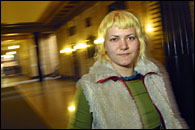On campus
Of course
Ethics of Violence and Non-Violence
 ILLUSTRATION: Tzigane
ILLUSTRATION: Tzigane |
|
Back in the fall, Scott Kline, a faculty lecturer in the Faculty of Religious Studies, was busy preparing for his winter course, "Ethics of Violence and Non-Violence."
And then, one fateful September morning, the world changed and the subject of Kline's course became more relevant than ever.
Kline has given the course before, and he says the classroom dynamics this time are definitely different.
"In the past, there would be a lot of discussion during the class. Now it seems as if students just want to listen and take in the information." The subject matter feels "much more in your face right now.
"There is more of a fear of saying something wrong. Students are much more likely to open up about what they think in a conference setting where there are fewer students and there is more of a sense of trust."
In the past, Kline, who has a background in political science, has dealt with such topics as the civil rights movement and spousal abuse. In the wake of September 11, the course has focused "on the sorts of things that are taking place right now -- the criteria for fighting a just war, intervention, peacekeeping, reconciliation."
Guest speakers from various religious faiths, including Hinduism, Islam and Judaism, "have offered us an insider's perspective on the sorts of debates going on in their own traditions," says Kline.
These traditions haven't come up with any easy answers, notes Kline, and debate rages within each about whether violence can ever be justified.
In Christianity, for instance, there are theologians such as Stanley Hauerwas who insist that "the peace ethic is an absolute ethic," while others, such as University of Chicago's Jean Bethke Elshtain, counter that Christian ethics have to be balanced against the constraints of the real world.
For a midterm essay, Kline's students have to analyze and respond to a recent declaration by 60 American scholars, including Elshtain, about why the U.S. is waging its war against terrorism.
One thing Kline hopes his students walk away from the course with is an appreciation for the fact that conflicts described in the media as "religious wars" are much more than that.
"There are always other factors -- political factors, economic factors, race factors -- that play into what appears to be principally a religious conflict."
If combatants themselves see war in religious terms, says Kline, it is because "religion helps people to make sense of the chaos."
Post-goalie goals
 Ken Dryden
Ken DrydenPHOTO: Toronto Maple Leafs |
|
Ken Dryden tends to defy expectations.
As a young law student at McGill, sporting glasses and a c.v. that included a stint with Ralph Nader, Dryden was a far cry from your stereotypical professional athlete when he became the goaltender for the Montreal Canadiens in the 1970s, helping the team win a remarkable six Stanley Cups in eight seasons.
When the six-time NHL all-star retired, Dryden turned the image of the inarticulate ex-jock on its ear, penning four best-selling books and serving as youth commissioner for Ontario.
In one of his books, In School, Dryden analyzed the Canadian educational system. The issues facing young Canadians hold a special allure for Dryden, now the president of the Toronto Maple Leafs. Dryden and his wife Lynda were recent recipients of the National Child Day special award from the Canadian Institute of Child Health in recognition of the couple's work in promoting children's health, well-being and rights.
Dryden returns to his alma mater this coming Saturday to talk about issues facing youth today. His talk begins at 2 pm in the Maxwell Cohen Moot Court Room of New Chancellor Day Hall (3644 Peel), and a reception follows. Entry costs $18, which goes to charity.
Salon des rejects
 Art History student Jenelle Davis
Art History student Jenelle DavisPHOTO: Owen Egan |
|
Feeling rejected? No need to at the second annual McGill student Rejection art event.
Art history student and McGill Daily photo editor Jenelle Davis recently put out a call to the McGill community and accepted all 50-plus submissions to the show.
She will hang them salon-style all over the walls at the World Beat Café. The static visual will be accompanied by dynamic audio and movement: DJs, bands, dance, and spoken word.
Davis wants to create a "salon des rejects," after the salon des refusés of France in which the Impressionists first thumbed their noses at conventional museum-going. "We are challenging the institutions and letting the community know about the art coming from McGill." Despite her own yen for Classical Greek art, she encourages different types of artists to participate.
Art should be available to all, she reasons. "Most galleries and museums today make it very difficult for the average person to enjoy or understand art." Snooty staff, enigmatic artists, and a reluctance to talk about motives for creating art can all contribute to the viewer scratching her head in puzzlement, or thinking, "I could have done that..."
Jargony and too-brief explanations often "leave the viewer even more confused and disenchanted than before they read the statement," surmises Davis.
Attendance is free, in accordance with Davis's beliefs. "It's a non-profit event. The World Beat Café has been very helpful because they're really into the multimedia aspect of it.
"There's an emphasis on music because it's accessible to everyone," Davis says. "People might come for the music and check out the art on the wall." The line-up includes breakdancing by a McGill hip hop troupe, spoken word by Dave Levine, and ;-), a band made up of music technology students.
Gawk at art and experience multi-sensory stimulation. Friday, March 15, and Saturday, March 16, at the World Beat Café, 1590 St. Laurent. Doors open at 7:30 pm, performances at 8:30 pm. If you want more information or to volunteer, email: rejectionartshow@hotmail.com.
Playtime at McGill
 Stephanie McMaster and Matty Brown in a scene from Two Girls, Three Guys
Stephanie McMaster and Matty Brown in a scene from Two Girls, Three GuysPHOTO: Owen Egan |
|
Sex and honesty, darkly comic student life, modern-day Faustus, poisonous mothers, familial dysfunction and girls musing about the guys in their lives and who they'd invite to dinner take to the stage in the McGill Drama Festival.
For 23 years, the MDF has been presenting six student-written and directed plays to the public -- two a night over nine nights. Liz Truchanowicz, coordinator, says "the Drama Festival tends to be a good starting-off point for someone going into drama."
Less time commitment is required than for the big departmental plays, and the call for cast and crew gets all kinds of people who may not be usually involved in theatre.
"We had a lot of submissions this year," Truchanowicz says. The reader, usually a professional in the field or a professor, had to choose from 18 plays, keeping in mind the restrictions of Players' Theatre (size, pool of actors, etc.). The reader doesn't see who wrote the plays, so there's no bias. Then they're grouped together for the performance schedule. By and large there's a shorter, lighter play first, with a more serious play after.
The line up is: March 6, 9, 15 -- Gotta Luv McGill by Michal Zilberman and Teresa by Jason Maghanoy; March 7, 13, 16 -- Sheila by Eleanore Altman and Minnie McGee by Kersti Kass; March 8, 12, 14 -- Two Girls, Three Guys by Dror Yuravlivker and The Centrifuges by Eli Batalion.
All shows are at Players' Theatre, begin at 8 pm and cost $5-8. Call 398-6813 for information and to reserve.

